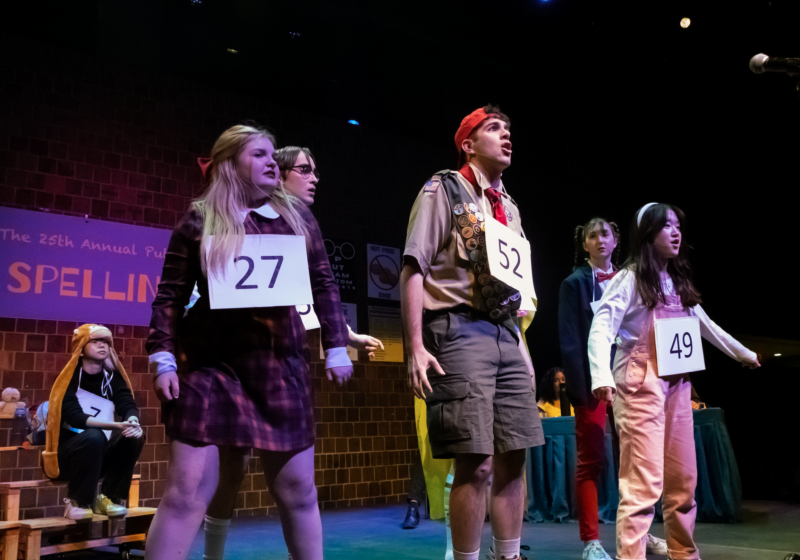The archetype of “theater kid” is one that’s hard to shake the negative connotation off of. It’s easy to be seen as annoying for sharing what you love — even amongst your peers — if you’re overly invested, and the act of putting oneself on stage to commit to goofs and gags can be equally as vulnerable as it is obnoxious. However, the humanity that is inherent in these ploys for attention, the fighting and yearning for a single breath in the haze of the spotlight, is also inherent to “The 25th Annual Putnam County Spelling Bee.”
Directed by sophomore Meghan Consorti, “Spelling Bee” is many things — exuberant, outlandish, and full of Heely-wheeling (specifically and shockingly well-executed by sophomore Oren Schwartz as the doofy, potentially haunted Leaf Coneybear). Emotionally volatile children pitted against each other to spell words of increasing (or, at some plot points, decreasing) difficulty is a recipe for tears of both joy and heartbreak, and the production team handles all of the beats well by setting the audience up to receive them from the second you enter the May Room.
The set design for the May Room is a cute preview of the fun to come, with arts and crafts and projects studding the walls and folding screens in a garishly adorable fashion. All of the stage dressings feel full of love, even just glancing at them. With how close you are to the stage, it’s easy to see every microexpression (or attempt to stifle laughter), which makes investing in each character and their silly names and silly costumes and silly quirks so easy to do. In addition, the props that the characters interact with (once again, mainly Schwartz) are delightfully goofy and immersive for the audience participants.
Speaking of audience participants, the Friday show (on March 31) was rife with its own cast of vivid characters solely due to those chosen to join the cast on stage. Some particular highlights included senior Adwoa Ampiah-Bonney’s raucous introduction up on stage with the cheering of her seatmates, and her equally chuffed reactions to all of the goings-on prior to her departure from the show, as well as Mark Freedman (the father of junior Noah Freedman, who played the Scout’s-dishonored Chip Tolentino), who hammed it up so hard that it was impossible to not bust out laughing at his antics.
It’s hard to beat a grown adult man embodying the vivacity and raw emotion of a fifth grader, but the cast held their own, even when the older Freedman nearly derailed some of the plot pacing. Props to senior Evan Coleman (playing the mental break-bordering vice principal Douglas Panch) for his interplay of reining in the audience (those on and off the stage) to progress story beats properly while leaving room for some truly hilarious moments.
The cast overall was very well-adjusted to their respective roles, and their solo spotlights — and accompanying jokes — all hit. However, while some characters felt like their arcs ended properly, some had their moments immediately overshadowed. Sophomore powerhouse Katya Figo as Marcy Park, in particular, had a delightful expositional song (of which she bodied), but the arc of her story and lack of emphasis on lines from other characters referencing her earlier in the show made her growth and departure feel less impactful.
This fast pace fuels an incredibly entertaining show, but it’s nice to get to enjoy each character’s send-off and appreciate the actors crushing their roles, which at points felt slightly blitzed through. This doesn’t mean that those with smaller parts didn’t make an impact — in fact, quite the opposite. The group did a great job of supporting each other’s personalities and cementing them as real, impactful effects on each character.
For example, I was taken with the sweetness of first-year Cordelia March (who played Logainne SchwartzandGrubenierre), her little braided pigtails, and her disgustingly campy fathers (assumed by Schwartz and Take 5 student Jack Bell, who also played the gritty Comfort Counselor Mitch Mahoney) near-immediately. Her quips were laced with the perfect amount of childlike, innocent acceptance that made me gasp on multiple occasions, and they hit even harder as reinforced by Schwartz and Bell’s flamboyant fierceness in their parenting decisions.
Similarly, Freedman’s Tolentino was silly and comfortable on stage, but where he really shone was in his vocal support across each group number, and — most breathtakingly — as a distant father figure to first-year Mikaila Son’s Olive in her power ballad “The I Love You Song.” Freedman and senior Anjali Blow, who played the comforting adjudicator Rona Lisa Peretti, did a lot of the heavy lifting vocally, which is impressive given the vocal strength from the cast overall. Blow has this control over her vibrato that is nearly Julie Andrewsian, and Freedman blasts out belted notes as if he was built to do nothing else. The facilitation of their incredible blend — which made my eyes water on some perfectly placed chords — and the backing instrumentals that supported them, by vocal director and sophomore Angelina Severino as well as music director and junior Jacob Rose, have to be lauded.
However, to return to the concept of being a vulnerable, sniveling annoyance, junior Charlie Morse completely blew me away with his portrayal of the inimitably confident William Barfée (the accent’s there for a reason, folks). Morse has the ability to scrunch a scowl on his face as if his face has been superglued into it — and in the small moments when he drops the act, like in his interactions with Son (whose adorable demeanor as Olive makes it impossible to not grin like a goof), it immediately pulls you in. He puts his lanky physicality to use in this role, flailing his legs about with all the grace of a fish out of water. The energy he puts in is near-cartoonish, and thus those really human moments are exposed within him in stark, gripping contrast.
There is something to be said for the portrayal of a lot of the characters as being over-exaggerated to the point of being potentially seen as mocking the archetypes of people they stem from. It’s important to be aware as an actor or director of these pitfalls. Despite the balls-to-the-wall humor, the grounding moments for each character — and their retained goofy quirks that shine through the various situations they’re in — ring true and make these characters feel alive and empathetic.
ROC Players, of all their strengths, shines most at putting their members to use, and with a cast and crew as star-studded as this, sitting down to watch a show like this can almost feel blinding. However, if my eyes get burnt beyond the possibility of regaining vision, “Spelling Bee” would be a pretty good last thing to get to see.
Editor’s Note (4/24/23): Titles of Angelina Severino and Jacob Rose altered/added to reflect their roles in the crew according to the playbill. Severino was originally incorrectly attributed to the role of music director.




